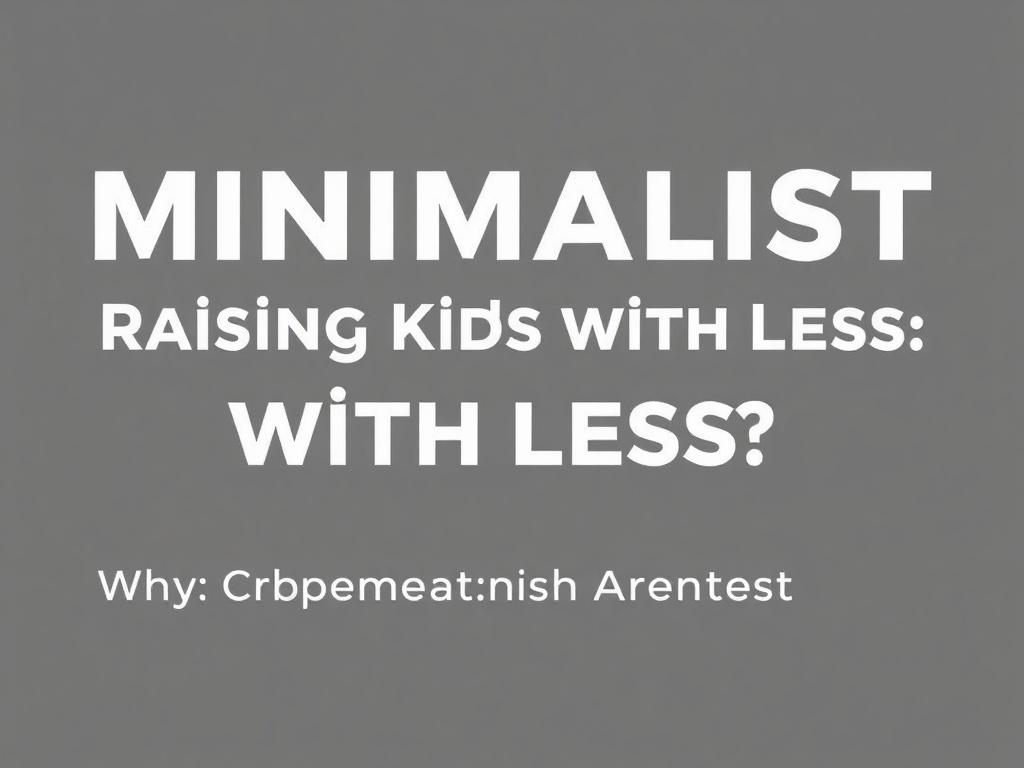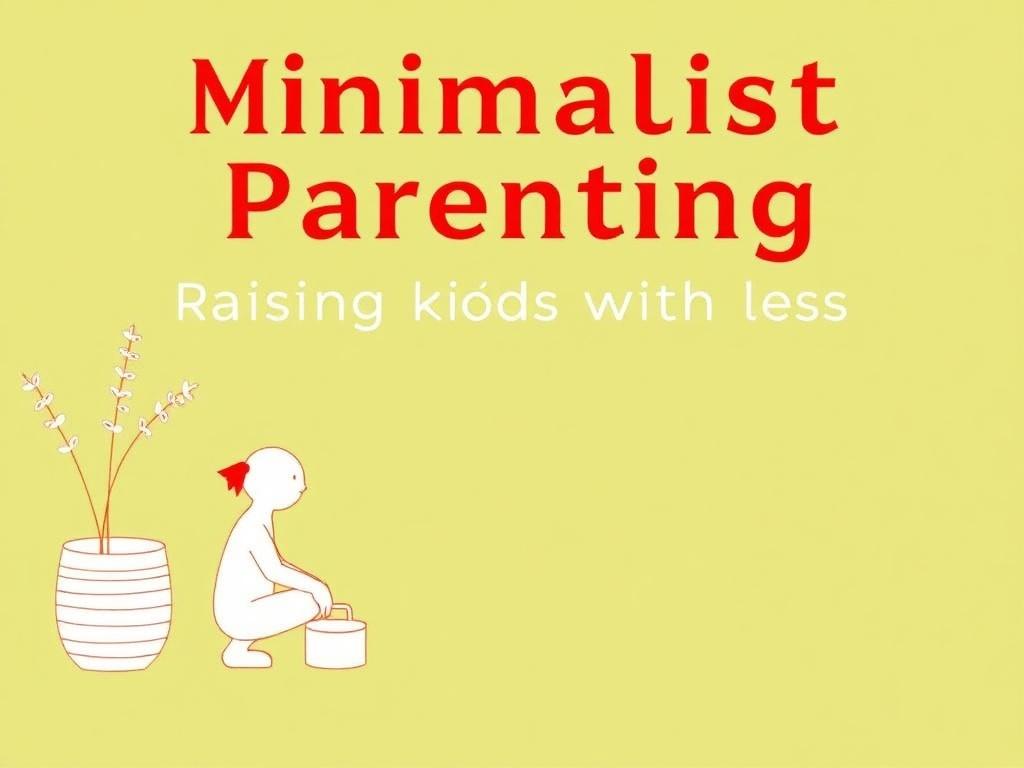SQLITE NOT INSTALLED
In today’s fast-paced, consumer-driven world, the art of parenting has become increasingly complicated. Toys pile up, schedules overflow, and the constant pressure to provide every possible advantage for our children can feel overwhelming. But what if there was a simpler way to raise children that focused less on quantity and more on quality? Welcome to the world of minimalist parenting, a philosophy centered on raising kids with less stuff but more meaningful experiences and values.
Minimalist parenting is not about depriving children but about changing the way we think about what is truly valuable in our family lives. It encourages parents to clear out the noise and distractions, focusing on what really matters — connection, growth, and joy. This article will explore the concept of minimalist parenting, practical strategies for adopting this approach, and the profound benefits it can bring to parents and children alike.
What is Minimalist Parenting?
At its core, minimalist parenting is about simplifying childhood. It’s the idea that children don’t need endless possessions, activities, or distractions to thrive. Instead, by paring down to essentials, both parents and kids can enjoy a more focused, meaningful, and peaceful family life.
Minimalist parenting involves deliberate choices: choosing quality over quantity, valuing experiences over things, and prioritizing time spent together over tasks and clutter. It’s about fostering creativity, independence, and happiness without the noise of excess.
This parenting style is a response to the modern tendency to equate love and care with constant buying and over-scheduling. Minimalism helps parents reconnect with what truly matters in raising kids.
The Philosophy Behind Minimalism and Parenting
The minimalist movement has grown beyond just tidying up physical spaces — it now influences lifestyle choices, including parenting. At the heart of this philosophy is the belief that less stuff leads to more freedom. When families have fewer distractions, they can focus on relationships, emotional health, and personal growth.
For parents, minimalism offers a path to reduce stress and overwhelm. For children, it invites curiosity, imagination, and resilience. Instead of relying on material things to entertain, kids learn to find joy in simpler pleasures such as nature, unstructured play, and genuine connection.
Why Choose Minimalist Parenting?

Deciding to embrace minimalist parenting can feel like a breath of fresh air, but it also raises questions. Why should parents actively choose less in a culture that encourages more? Let’s explore the compelling benefits that have persuaded many families to adopt this approach.
1. Reduces Stress and Overwhelm for Parents and Kids
With fewer possessions to manage and less busywork in daily life, the entire family experiences less stress. Parents aren’t buried under piles of toys or juggling endless activities, while children enjoy calmer, more consistent routines. The result? Everyone feels more relaxed and present.
2. Teaches Children the Value of Essentials
Minimalist parenting encourages children to appreciate quality over quantity. Instead of constant accumulation, kids learn to care for and value their belongings, fostering responsibility and gratitude. This mindset often leads to less wastefulness and more thoughtful choices as they grow.
3. Boosts Creativity and Imagination
When children are not overwhelmed by a surplus of toys or screens, they naturally turn to imaginative play. Open-ended toys and unstructured time feed creativity, problem-solving, and independent thinking. Minimalist parenting supports this environment, nurturing cognitive development.
4. Strengthens Family Bonds
Prioritizing experiences and time over material things paves the way for deeper family connections. Whether it’s shared meals, storytelling, or outdoor adventures, minimalist parenting encourages meaningful interactions rather than distraction-filled moments.
5. Saves Money and Resources
Less shopping and fewer possessions translate to significant cost savings. Families can redirect resources towards experiences, education, or savings. Additionally, minimalism fosters sustainable living by reducing consumption and waste.
How to Practice Minimalist Parenting: A Step-by-Step Guide

Now that we understand the philosophy and benefits, the next logical step is figuring out how to put minimalist parenting into action. Transitioning towards a minimalist lifestyle with kids takes intention and consistency, but the payoff is worth it. Let’s break it down into manageable steps.
Step 1: Declutter and Simplify Physical Spaces
The hallmark of minimalism starts with the physical environment. Begin by reviewing the children’s toys, clothes, books, and belongings:
- Sort by necessity and joy. Keep items that children actively use or that spark happiness.
- Donate or recycle the rest. Excess items are passed on to those in need or responsibly disposed of.
- Create organized, accessible storage. When kids can easily find and put away their items, their independence grows.
Reducing clutter isn’t a one-time event but an ongoing habit. Regularly revisiting possessions helps maintain a minimalist environment.
Step 2: Limit Screen Time and Over-Scheduling
Another aspect of minimalist parenting is stepping away from digital overload and overbooked calendars. Parents can:
- Set reasonable limits on screen time that balance education and recreation.
- Choose a few meaningful extracurriculars rather than packing every moment with activities.
- Preserve free time for rest, creativity, and family interaction.
By surrounding children with space rather than slots, kids develop opportunity to explore their interests naturally.
Step 3: Emphasize Experiences Over Things
Rather than focusing on gifts and material rewards, minimalist parenting encourages creating memories:
- Plan family outings and adventures regularly.
- Celebrate milestones with quality time instead of piles of presents.
- Encourage kids to participate in the process of gift-giving, such as making homemade presents.
These experiences forge lasting impressions far richer than anything purchased.
Step 4: Teach Mindfulness and Intentional Living
One of the deepest aspects of minimalist parenting is fostering awareness and intention. Parents can model and teach mindfulness by:
- Encouraging children to reflect on what they truly need and value.
- Creating rituals around gratitude and appreciation.
- Slowing down daily routines to savor moments fully.
These habits help children grow emotionally and become thoughtful adults.
Step 5: Cultivate Connection Through Communication and Presence
Minimalism makes space for genuine connection. Simple acts like turning off phones during meals, practicing active listening, and sharing stories build bridges between parents and kids. This presence fosters security, trust, and joyful relationships.
Minimalist Parenting Tips and Tricks
Embracing minimalist parenting is a journey that often requires creative problem-solving. Here are some practical tips and tricks to help along the way:
| Challenge | Minimalist Solution |
|---|---|
| Too many toys, cluttered playroom | Rotate toys by storing away a portion, only bringing out what’s in use |
| Feeling guilty about limiting kids’ activities | Focus on quality and choice rather than quantity; involve kids in picking activities |
| Gifts and birthdays creating accumulation | Sponsor experience gifts, arts and crafts, or contribution to charities instead of toys |
| Resistance from extended family or friends giving lots of presents | Communicate your values honestly; suggest useful or consumable gifts |
| Keepsakes and sentimental items building up | Create a small memory box; digitize photos and drawings for preservation |
Common Misconceptions About Minimalist Parenting
Minimalist parenting is a concept that sometimes meets resistance due to misunderstandings. Let’s address some common misconceptions so you can approach this lifestyle confidently.
Minimalist Parenting Means Deprivation
Many people worry that raising kids with less means taking away fun or love. On the contrary, minimalist parenting is about providing more freedom and emotional richness. It’s not about scarcity but intentional abundance in experiences and relationships.
It’s Only About Decluttering Toys
While physical decluttering is a significant component, minimalist parenting also emphasizes time management, emotional focus, and intentional living. It addresses more than just possessions.
Minimalist Parents Are Perfect
Minimalism doesn’t demand perfection. It’s a flexible guideline that adapts to individual family needs and stages. Progress, not perfection, is the goal.
Minimalism Means No Screen Time or Outside Help
Minimalist parenting is about balance and intentional choices, rather than strict rules. It acknowledges the reality of modern life and uses technology and support when appropriate and meaningful.
Minimalist Parenting in Different Age Groups
Minimalist parenting adapts as children grow. Here’s how this philosophy can be tailored across different developmental stages:
Infants and Toddlers
For the youngest children, minimalist parenting focuses on a calm, nurturing environment. Parents can keep only the toys and supplies necessary for development and safety. Simplicity allows babies to explore sensory experiences without overstimulation.
Preschoolers
At this stage, kids begin imaginative play, so minimalism encourages open-ended toys like building blocks rather than flashy gadgets. Emphasize nature outings and creative activities. Limit structured classes to avoid overwhelm.
School-Age Children
As children develop hobbies and friendships, minimalist parenting supports choosing a few meaningful activities and hobbies rather than many surface-level ones. This approach helps build deeper skills and reduces stress for the whole family.
Teenagers
Minimalist parenting with teens involves open communication about values, consumption, and time priorities. Encourage autonomy with gradual responsibility for possessions and schedules. Maintain honest dialogues about the benefits of simplicity in a complex world.
Resources and Tools for Minimalist Parents

Embracing minimalist parenting can be challenging, but thankfully there are many resources and communities that support this lifestyle. Here are some helpful options:
- Books: Titles such as “Simplicity Parenting” by Kim John Payne or “The Minimalist Mom” by Rachel Jonat provide inspiration and actionable advice.
- Blogs: Many parenting bloggers share stories, tips, and product recommendations to help with decluttering and intentional living.
- Communities: Online groups and local meetups can offer encouragement, accountability, and ideas.
- Apps: Decluttering and time management apps assist families in setting goals and tracking progress.
Success Stories: Real Families Embracing Minimalist Parenting
To truly understand the power of minimalist parenting, hearing from families who have adopted this lifestyle is illuminating. Here are a few inspiring examples:
- The Johnson Family: After an overwhelming mid-year, the Johnsons donated thousands of dollars worth of toys to charity. They now enjoy weekly hikes and board game nights that bring the family closer, reporting less stress and more laughter.
- Emma and Mark: With three children under 8, Emma and Mark minimized screen use and organized a “one-in, one-out” toy policy. Their kids’ focus and creativity blossomed, and evening routines became calm and joyful.
- The Lopez Family: Facing relentless birthday gift piles from relatives, the Lopez family began suggesting experience gifts and set a “no junk food” gift rule. Celebrations became more meaningful and reduced their waste footprint.
Challenges to Anticipate and How to Overcome Them
Like any lifestyle choice, minimalist parenting isn’t without its challenges. Being prepared helps set your family up for success.
Dealing with Peer Pressure and Social Expectations
Children and parents may feel pressure to conform to a culture of excess. Helping kids understand your family’s values and fostering confidence protects them from these influences.
Managing Relatives Who Don’t Understand Minimalism
Extended family may resist or misinterpret your choices. Open communication, setting gentle but firm boundaries, and suggesting acceptable gift ideas help maintain harmony.
Balancing Flexibility and Discipline
Minimalism isn’t about rigid rules but consistent intention. Give yourself grace and adjust practices to fit your family’s rhythms and needs.
Maintaining Minimalism Through Life Changes
Whether moving, new siblings, or school transitions, continual reassessment and gentle recalibration help sustain minimalist parenting principles.
Conclusion: Embracing the Freedom of Raising Kids with Less
Minimalist parenting offers a transformative way to raise children. It invites families to step off the consumption treadmill and focus on what truly matters: love, presence, and meaning. By simplifying physical possessions, limiting schedules, and prioritizing experiences, parents can foster healthier, happier, and more engaged children.
This approach isn’t about perfection but about making intentional choices that benefit your family’s well-being and growth. The freedom and peace that come with raising kids with less are gifts that last a lifetime — for parents and children alike.
If you’re ready to start your minimalist parenting journey, remember it’s a process of small, thoughtful changes that together create a richer, more joyful family life.
So, what’s one area of your family life where you can start embracing minimalism today?
